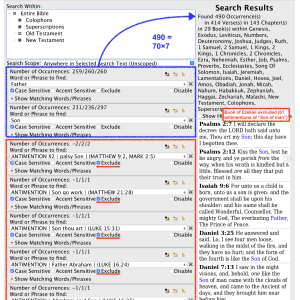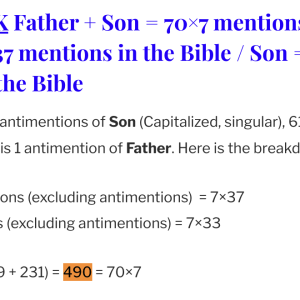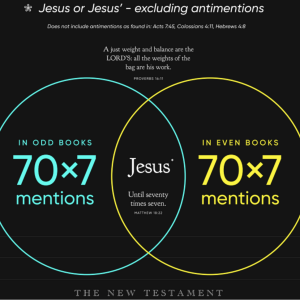I'm not following you. Agree that there can be the kind of difference you mention, but Jesus does specifically say that both should be done:
23 “Woe to you, teachers of the law and Pharisees, you hypocrites! You give a tenth of your spices—mint, dill and cumin. But you have neglected the more important matters of the law—justice, mercy and faithfulness. You should have practiced the latter, without neglecting the former.
Saying not to neglect the former is not saying both should be done, as neglect is a particular disregard. So while it's true that Jesus isn't condemning their meticulous tithing per se, he isn't necessarily giving an endorsement to it either. He's cutting off a potential objection, rather than giving a command to follow.
I disagree. There were some arbitrary Mosaic rules that were tied up with Jewish identity. I'm thinking specifically of the instruction to not cut the hair on the sides of their heads. But I would estimate that > 70% of the regulations fall into the "don't do this because it is a bad thing for any human being to do" category. You are saying that only laws that are "prohibited far more widely, basically universally" are applicable. So when God told them to not worship idols, this wouldn't still apply because it wasn't followed universally? That makes no sense. Paul, indeed, doesn't seem to worry too much about idols:
4 So then, about eating food sacrificed to idols: We know that “An idol is nothing at all in the world” and that “There is no God but one.” 5 For even if there are so-called gods, whether in heaven or on earth (as indeed there are many “gods” and many “lords”), 6 yet for us there is but one God, (1 Cor 8)
Whereas the resurrected Jesus, in Revelation, specifically calls this practice out:
20 But I have this against you, that you tolerate that woman Jezebel, who calls herself a prophetess and is teaching and seducing my servants to practice sexual immorality and to eat food sacrificed to idols.
While the cutting of the hair has come to be one of the identifying markers of modern Jewish identity, it wasn't one in the ancient world. The context is important to understand the Biblical texts, which your two examples show perfectly. Neither of them are in contradiction to one another, and while they appear similar they aren't when the context is understood. When Paul is discussing eating food sacrificed to idols, he is writing to people who are concerned they can't buy any food in the market because they can't distinguish between what has and hasn't been sacrificed to an idol. So Paul highlights that the idols are just statues, the act of sacrificing the food to them doesn't change anything about the food. Whereas in Revelation the practice is knowingly eating food sacrificed to idols as part of a ritual, in worship of the idol. Which Paul also condemns within 1 Cor. The separation between laws that set the Jews apart as Jews in the ancient world, vs those that were recognized as immoral by the wider world makes a very important distinction because what Paul is dealing with is the question of what makes a Christian a Christian, because there were some who wanted to compromise their exclusive devotion and identity as belonging to the Messiah in order to be accepted by the Jews through requiring circumcision, dietary restrictions, and Sabbath laws on gentile converts. So what Paul was opposing was not adherence to a set of moral guidelines, but the rejection of Jesus' paradigm shifting existence. On the one hand, the compromisers wanted there to be no difference pre- and post- Messiah. They wanted the world to be continued to be divided between Jew and gentile, with the gentiles on the outside of God's acceptance. So the fact that the laws Paul chose to highlight were the specific ones that were seen as setting apart the Jewish nation are not coincidental, but crucial to the arguments being set forth.
I think that much confusion comes from when one considers if an action is being done for moral reasons, for natural reasons. Take the washing of hands. Many a mother has insisted that their child washes hands before coming to supper. Compare that to the handwashing of the Pharisees who saw it as a matter of holiness (and self-sanctified satisfaction). So when Christ lambasted the Pharisees for their exasperating actions, He may well have swept up their teachings of handwashing with everything else. But that doesn't mean handwashing is bad. It is a good thing (unless overdone).
I'm not sure what purpose your pointing this out is supposed to serve.
So lets go back to the issue of eating. A quick web search pulls up this article:
An Evidence-based Look at the Effects of Diet on Health showing that what humans eat has a huge impact on health. So while the gospels indicate that Jesus declared all foods clean (Mat 7:19), this does NOT mean that you would want to eat food that had just fell in some manure. And the counsel at Jerusalem gave counsel to the Gentiles very very few recommendations for life (Act 15).
19. It is my judgment, therefore, that we should not make it difficult for the Gentiles who are turning to God. 20 Instead we should write to them, telling them to
- abstain from food polluted by idols,
- from sexual immorality,
- from the meat of strangled animals and
- from blood.
Notice that 3 of the 4 recommendations relate to food. Paul doesn't seem to take this to heart, but I'll leave it to others to decide if Paul's opinion should outweigh the opinion of all the other apostles.
Again, Paul does take it to heart which is clear in 1 Cor, it's only when stripped of its context that it may appear that he doesn't. At this point, it seems as if your primary purpose is to undermine Paul, rather than to understand what is being instructed in the Bible.
So the point I seem to be making badly is that Paul, at best, seems to be pointing to the self-sanctimonious effects of Jews who felt no need to follow Jesus because they had it all figured out with their handwashing and careful diets. And perhaps those guidelines had to be set aside for a time to lower the barrier of entry to the sheep from Christ's other pastures. But that is NOT to say that in the real world, there are real-life benefits from following rules.
"Tie your shoelaces", I'll say.
"You can't tell me what to do, I'm free in Christ!" is the reply, followed by a trip on their face.
Some confuse what Paul has said as being opposed to legal guidance in general, and that's certainly worth opposing. But your suppositions about lowering the barrier for entry temporarily are entirely baseless, and don't seem to engage with what Paul is actually arguing in his letters. What was at stake is whether or not Jesus being the Messiah meant anything, or if it was just business as usual for the people of God. To return to the structures that existed before the advent is treason to the king, and this is on a permanent basis not simply a temporary lowering the bar of entry.
I hear what you are saying, but I'm not convinced. I say Paul contradicts himself, and you say he doesn't. And exactly how does letting Satan destroy a man's flesh lead to the salvation of his soul?
His soul was already saved because he belongs to Christ, but he would not crucify the flesh himself. Paul doesn't contradict himself, because no where does Paul claim that there is no standard for holy living. In fact, within every single one of his arguments against the law he heightens the requirement for holiness to a more stringent level.
I agree.
So there is no way to have a system of truth, but NOT because the bible doesn't provide sufficient information for this? That doesn't make sense to me.
Systems of truth are fabrications, but the inability to build one is not because of a flaw in the Bible or because there exist contradictions within the Biblical texts. The issue is that reality, and ethics, are not divided up into neatly digestible packets. So the Bible contains all there is for us to know about these things, but as soon as we start trying to force it into some kind of system we distort what is written in the Bible.
Paul is now with us today, so I can't talk with him. But I can talk to people who take what Paul said to someone else a long long time ago, and then try tell me it applies today. Do all the women in your church always keep quiet and have their heads covered in submission, "because of the angels"? Some churches are this way, but not many. Perhaps it was appropriate then, but not now. Perhaps it was appropriate to say that Gentiles could eat whatever they want. But today perhaps we would caution that a diet of McDonalds does not lead to a happy long life -- regardless of what Paul said about not being restricted by a "do not eat".
KT
You're talking about two different things, because Paul himself argues against what you claim he is in favor of within the letters we have...for example:
23 “All things are lawful,” but not all things are helpful. “All things are lawful,” but not all things build up. 24 Let no one seek his own good, but the good of his neighbor.
The issue you seem to be having is you're taking drive-by swipes at Paul and accusing him of saying things he doesn't say based on snippets of his letters, rather than taking the time to understand the letters as a whole in their historical context. Let's return to your accusation with food for idols, sure if we stopped at 1 Cor 8 we might get the impression that Paul is telling them to eat foods sacrificed to idols to their hearts content because idols are nothing. But if we read the whole letter, we'd come across this:
14 Therefore, my beloved, flee from idolatry. 15 I speak as to sensible people; judge for yourselves what I say. 16 The cup of blessing that we bless, is it not a participation in the blood of Christ? The bread that we break, is it not a participation in the body of Christ? 17 Because there is one bread, we who are many are one body, for we all partake of the one bread. 18 Consider the people of Israel:[
d] are not those who eat the sacrifices participants in the altar? 19 What do I imply then? That food offered to idols is anything, or that an idol is anything? 20 No, I imply that what pagans sacrifice they offer to demons and not to God. I do not want you to be participants with demons. 21 You cannot drink the cup of the Lord and the cup of demons. You cannot partake of the table of the Lord and the table of demons. 22 Shall we provoke the Lord to jealousy? Are we stronger than he?
Seems like he may be contradicting himself, if that's all we have to go on. In one place, it's ok to eat food sacrificed to idols, in another, it's not ok. In the same exact letter. So is Paul contradicting himself? No, and we find out why shortly after.
Eat whatever is sold in the meat market without raising any question on the ground of conscience. 26 For “the earth is the Lord's, and the fullness thereof.” 27 If one of the unbelievers invites you to dinner and you are disposed to go, eat whatever is set before you without raising any question on the ground of conscience. 28 But if someone says to you, “This has been offered in sacrifice,” then do not eat it, for the sake of the one who informed you, and for the sake of conscience— 29 I do not mean your conscience, but his.
So we can put it all together, the central issue that the Corinthians were wrestling with was meat that may or may not have been sacrificed to idols. Paul denounces eating food sacrificed to idols religiously in 1 Cor. 10:14-22, which is what the Acts prohibition and Revelation judgment are dealing with. So he's consistent with both of those. But he adds nuance to the picture, because of a couple of realities the people of Corinth were dealing with in their cities. First was accidentally eating meat sacrificed to idols because it isn't disclosed to them, and second is being put in a situation where their neighbors would see them eating meat sacrificed to idols with full knowledge. In the first case, Paul argues that it makes no difference because the meat is not corrupted by being sacrificed to the idol, because it is the act of worship that is forbidden not pollution from contact with something unclean. The second he forbids, regardless of whether there is an act of worship involved because he doesn't even want to give a hint of endorsement to these false gods.
Now, if we fly-by-night we can certainly get the impression that Paul contradicts himself and the rest of the Bible. But it seems to me that when we get this impression, it's something we have mistaken because Paul is often making nuanced arguments that aren't delved into within the rest of Scripture. He's dealing with real situations in churches, and is a study in applied theology. There are a lot of reads on Paul that aren't consistent with the Bible as a whole, and some of these are common, but these usually come from not understanding the historical picture that Paul is dealing with and instead bringing in a different set of historical assumptions.










